Umoza Coffee Raises Hope To Malawi’s GDP Growth

Despite Malawi’s first-ever coffee trees grown in the late 1800s, by way of Dr. John Kirk and John Buchanan from the Royal Botanic Gardens in Edinburgh until the present time the stimulant plant is still believed to be for the middle and elite class, several welfare monitoring research findings have shown.
Considering coffee’s contribution to the country’s economic and Gross Domestic Product (GDP) growth, in 1971, government established Smallholder Coffee Authority to be providing farmers with seed money and marketing linkages but due to mismanagement the organization was in 1999 replaced by the Smallholder Coffee Farmer’s Trust.
It is against this background that a 31-year-old Mzuzu based Lyton Femason Newa came up with Umoza Coffee but with a different business operating model which is an upgrade toward better cooperation with farmers themselves being in the center stage in its management.

In an exclusive interview on Monday, Newa bemoaned lack of proper investment capital which he said hinders sales and consumption of Malawi grown coffee despite the availability of ready markets locally and in several corners of the global village hence Malawi losing out on the GDP.
However, the youthful entrepreneur whose benefit calls for collaborated efforts among economic players in the coffee production towards achieving “cup umodzi mtima ziii” (one cup of coffee is enough) in satisfaction of ones’ appetite to the stimulant.
“Malawi is one of the countries which produce, best coffee in the world and if farmers and off-takers were properly supported, there could be a huge potential contribution to the country’s GDP.
Meanwhile, we have a market in Namibia and we need support so that we can clinch another deal of exporting 18 metric tons of coffee to a western country,” said Newa.

Without elaborating much, Newa weighed on, on famers disappointment for being duped by some cooperatives, hence his decision in doing business directly with ordinary farmers through medium and long term partnerships aimed at creating win-win situations.
Having employed a total of eleven 11 graduates with various expertise, Umoza Coffee as a firm is looking for an investment capital of about K100 million to supplement its operations but he ruled out the possibility of accessing the country’s punitive bank loans which attract high lending interests.
Malawi has a lot of potential of producing quality coffee due to its subtropical climate, soils and altitude amidst some challenges in the region, but Malawian perseverance is surely at play within the growing coffee production industry the country.
In 1999, Mzuzu Coffee Planters Cooperative Union was also formed and has a membership of over 3000 members out of whom 25 percent are women and much is accomplished by themselves and similar organizations to enhance the country’s economy through the promotion of sustainable coffee growing.
However, the Association of International Coffee Traders Organizations helped Malawi fight back against coffee wilt and progress towards bolstering the industry.
On the global scale, currently, coffee is a minor export crop for Malawi but offers income generating opportunities through, exporting high quality produce, thereby, the country realizing revenue from the sales with facilitation by local co-operatives including Umoza Coffee.
- Draxon Maloya, Mzuzu-Malawi.




